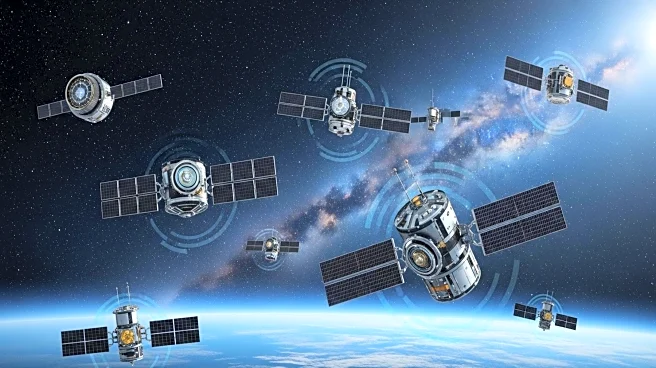What's Happening?
SpaceX, led by Elon Musk, has made a significant move to enhance its Starlink internet service by purchasing $17 billion in wireless spectrum from EchoStar. This acquisition is aimed at delivering direct-to-cellular service, effectively eliminating mobile dead zones and increasing Starlink's capacity over 100-fold. On September 28, SpaceX launched 28 Starlink V2 Mini satellites from Vandenberg Space Force Base, utilizing the Falcon 9 rocket's first-stage booster B1063 for its 28th flight. This launch is part of SpaceX's ongoing efforts to expand its low-orbit broadband constellation, which now includes over 5,500 satellites. The company plans to deploy tens of thousands more satellites to achieve global broadband coverage.
Why It's Important?
The expansion of Starlink's capabilities through the acquisition of wireless spectrum is a pivotal development in the satellite internet industry. By increasing its capacity and offering direct-to-cellular services, SpaceX is positioned to significantly impact global internet accessibility, particularly in remote and underserved areas. This move could disrupt traditional telecommunications by providing an alternative to ground-based internet services, potentially benefiting consumers with improved connectivity and competition. Additionally, the increased satellite deployment supports SpaceX's goal of providing comprehensive global coverage, which could have far-reaching implications for internet access worldwide.
What's Next?
SpaceX's acquisition of the spectrum and the continued deployment of Starlink satellites suggest further advancements in satellite internet technology. The company is likely to focus on integrating the new spectrum capabilities into its existing infrastructure to enhance service delivery. As SpaceX progresses, stakeholders such as telecommunications companies, regulatory bodies, and consumers will be closely monitoring the impact of these developments. Potential regulatory challenges and competitive responses from traditional internet service providers could shape the future landscape of global internet access.
Beyond the Headlines
The acquisition of wireless spectrum by SpaceX highlights the growing importance of satellite technology in bridging digital divides. This development raises questions about the ethical and regulatory implications of satellite internet, including issues of privacy, data security, and equitable access. As satellite internet becomes more prevalent, policymakers may need to address these concerns to ensure that the benefits of increased connectivity are distributed fairly across different regions and communities.









